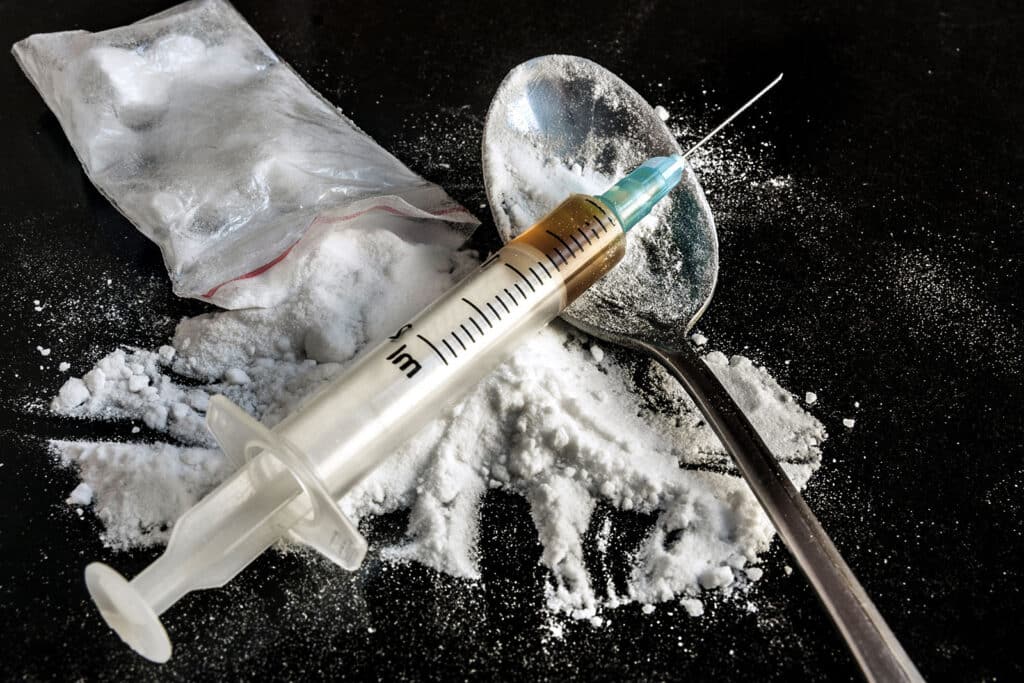Opiates like heroin and other opioids have wreaked havoc on communities worldwide, and the problem is only worsening. For many individuals who struggle with addiction, kicking a heroin habit can be extremely difficult. Thus, if you or a loved one struggles with addiction, you must explore the following guide on heroin and drug addiction treatment plans to find the right treatment programs free from health problems related to heroin overdose.
Table of Contents
- What Is Heroin?
- Signs Of Heroin Abuse
- How Does Someone Become Addicted To Heroin?
- Who Is At Risk Of Becoming Addicted To Heroin?
- How Is Heroin Addiction Diagnosed?
- The Effects Of Heroin Abuse
- Heroin Addiction Treatment
- Medical Detox
- Addiction Counseling At A Heroin Addiction Treatment Center
- Future Sobriety Begins Here At Illinois Recovery Center
- Get Help From Our Heroin Addiction Treatment Center
What Is Heroin?
Heroin is an opioid that is made when producers combine morphine with other substances, and it is generally stronger than morphine. Like all opioids, producers derive heroin from the opium poppy plant. However, as opposed to medical-grade opioids, heroin has many impurities. Thus, it can be even more dangerous for users of the drug. In its basic form, it comes as a white or brownish powder, depending on the purity of the substance and added adulterants. It can be snorted, injected, and sometimes smoked or vaporized, and overdoses are very common, resulting in substance use disorder.

The most recognized full agonist opioids (a drug that activates the opioid receptors in the brain fully resulting in the full opioid effect) are heroin, morphine, codeine, oxycodone, meperidine, and fentanyl and other opioids are strong pain relievers, and the side effects of their use include euphoria, intense calmness, and a general sense of escape from life’s worries.
Moreover, due to their chemical makeup, opioids tend to be highly addictive. However, although they may make a person feel good, they can be extremely hazardous when mishandled.
This is especially true for heroin because it is not created and distributed in a clinical setting. Instead, street dealers, cartels, and other criminals often mix heroin with other powdery substances to extend their supply and make more money.
As more middlemen are involved in the process, more and more adulterants are added to the already dangerous drug, making it even more hazardous to the person who uses it later. For heroin users, there is no tried-and-true method for ensuring the purity of the drug, so the vast majority of heroin users cannot be sure about what dangerous chemicals they may be dealing with.
Signs Of Heroin Abuse
As with most drugs, heroin abuse has some telltale signs and symptoms. However, even though a person may not noticeably exhibit many or any of these symptoms, that doesn’t mean they are not using the drug. Many people suffering from addiction are very good at hiding their behaviors and the effects of their drug of choice. Similarly, some people may exhibit similar symptoms for more benign reasons. The following symptoms are prevalent among people who use heroin. However, you shouldn’t jump to conclusions if you notice one or more of these symptoms in a loved one.
Injection Marks and Nosebleeds
These are among the more apparent symptoms of heroin abuse. Users often inject heroin or insufflate it through the nose. Users often inject around the veins in the arm. Eventually, they will move to the hands, legs, feet, and anywhere else with usable veins. Naturally, a needle will leave small marks at each point of injection. When someone snorts heroin in its powder form, there is a chance that they will damage the inside of their nose, resulting in a nosebleed.
Money Troubles
Heroin isn’t cheap, and as the addiction progresses, more and more heroin is required to achieve the same high. As a result, heroin users must keep spending more money to maintain their habit as time passes. They may neglect important expenses like rent, car payments, utilities, and groceries. They may also start asking friends and family members for money. When pressed for more information, these requests are sometimes accompanied by elaborate stories or wild tales. However, believable stories tend to fall apart after some scrutiny.
Theft And Dishonesty
Often, individuals who struggle with addiction may not be very honest about their habits or whereabouts. In time, you may catch them telling several white lies. Also, once they can no longer borrow money, they may resort to stealing items and money to buy heroin. If you’ve noticed that cash or other valuables have recently gone missing, that could indicate a more significant problem.
Lethargy And Flu-Like Symptoms
Opioids cause users to become very drowsy, so they may not have the drive or ability to exert themselves. Slurred speech, sleepiness, and a general sense of disconnect are very common among individuals who use heroin. When people aren’t using heroin, they may experience withdrawals. Upset stomach, drowsiness, general malaise, and other flu symptoms occur when an individual has not had a recent dose.
Long Or Repeated Bathroom Breaks
Opioids are notorious for causing constipation and digestive issues. When someone abuses opioids, they may be unable to make a bowel movement for days or weeks at a time. People who use opioids often feel like they have to use the bathroom. However, no matter how long they sit on the toilet, they just can’t empty their bowels.
As a result, long and repeated bathroom breaks become frequent as they try to relieve the intense discomfort resulting from constipation. To help move things along, many individuals who struggle with opioid addiction rely on strong laxatives. Sadly, laxatives can seriously affect the body after prolonged use and may exacerbate the problem.

How Does Someone Become Addicted To Heroin?
Most people don’t start with heroin. Often, the cycle of abuse starts when someone has been prescribed prescription opioids for pain management. Eventually, they become physically dependent on prescription opioids. However, they may turn to heroin for a cheaper, more available alternative between the cost of prescriptions and the unstable supply. As they continue to use the drug, they will require more and more of it to satiate their addiction.
Who Is At Risk Of Becoming Addicted To Heroin?
Anyone who relies on prescription opioids to manage their pain is at a higher risk of addiction. This is especially true for people who are taking prescription opioids after an accident. Once they heal, their doctor will eventually stop prescribing painkillers, but they may already be addicted. Consequently, they may turn to heroin to fuel the addiction that formed during recovery. Also, individuals who dabble in recreational drugs are more likely to try prescription opioids in a recreational setting. This can eventually progress to drug addiction – opioid dependence, and they may turn to heroin later on.
How Is Heroin Addiction Diagnosed?
In conjunction with a drug test to assess drug use, a psychiatrist or other medical specialist will check a patient’s symptoms and reported behaviors against the Diagnostic and Statistical Manual of Mental Disorders. The medical professional will likely recommend detoxification and addiction treatment programs from there.
The Effects Of Heroin Abuse
Short-Term Effects Of Heroin Addiction
When someone uses heroin, their heart rate slows, and their breathing becomes shallow. Individuals who are under the influence of heroin often seem drowsy and carefree, and their speech may be slurred. If too much heroin is consumed at once, the individual may overdose.
Overdoses can be deadly, and symptoms include shallow breathing, foaming at the mouth, severe confusion, unresponsiveness, and loss of consciousness. If you think someone has overdosed, you must call emergency medical personnel as soon as possible. Otherwise, they could die.
Long-Term Effects Of Heroin Addiction
Over time, heroin use will result in mood swings, confusion, and severe organ damage. Skin, heart, and lung infections are common with prolonged use. Because heroin is often injected, users are at a high risk of contracting hepatitis, HIV, and other transmittable diseases.
Heroin Addiction Treatment
Once the addiction is diagnosed, a specialist will usually recommend a detoxification program. Depending on the extent of the individual’s addiction, they may need to be put under supervised inpatient care during the detoxification process. Once detox is over, the patient can begin exploring long-term addiction therapy at a heroin addiction rehab center.
Medical Detox
When someone stops using heroin, their body goes into withdrawal. Withdrawal symptoms include severe illness, hallucinations, malaise, physical weakness, vomiting, migraines, insomnia, fever, and a host of other serious symptoms. Detoxification can be very dangerous for patients to experience without medical supervision. Thus, detoxification centers have doctors and other medical personnel on staff to keep patients safe and healthy throughout the process.

Addiction Counseling At A Heroin Addiction Treatment Center
A team of addiction experts will work with a patient to find the type of treatment for their unique needs. Generally, effective treatment will include group therapy, the right kind of individual therapy for the patient’s needs, and a combination of other therapies to achieve the best results. During a patient’s treatment, therapists and addiction professionals will consistently evaluate their progress and adapt their approach accordingly. Therapy aims to instill lifelong skills to help the patient adapt to a sober lifestyle. The following treatments are among the most common, but each patient’s treatment process will vary depending on their circumstances.
Cognitive-Behavioral Therapy (CBT)
A person’s habits are often the result of how they think about themselves and the world around them. Someone with bad habits may have maladaptive ways of thinking about things that drive them towards negative behaviors. CBT is an individual therapy that helps patients recognize patterns in their thoughts and feelings that may negatively affect their actions. After regular CBT, patients will be more mindful of how their thoughts influence their actions and gain greater agency over their behaviors.
Dialectical Behavioral Therapy (DBT)
The primary focus for people with DBT is to help people manage stress, regulate emotions, and experience better relationships. This individual therapy is especially useful for people with interpersonal problems that may contribute to their substance abuse. DBT is also extremely useful for treating co-occurring psychiatric disorders that may exacerbate substance misuse.
Group Therapy
In support groups like group therapy, patients can share their struggles, successes, and feelings with several of their peers. Group therapy encourages understanding and empathy, and many patients feel relieved to realize that many others go through similar struggles. With group therapy, patients can connect with people with similar issues while contextualizing their thoughts, feelings, and behaviors.
Other Types Of Therapy
Drug abuse addiction professionals often combine the aforementioned therapies with a host of other supplemental therapies. For example, one patient may benefit from art therapy, and an exercise regimen can help another patient focus their energy. These other therapies give patients a useful outlet for their feelings and often inspire or encourage healthy lifelong interests for their long-term recovery process.
Future Sobriety Begins Here At Illinois Recovery Center
The first step for anyone struggling with addiction is to admit that they have a problem. By researching addiction and treatment interventions, you are taking a vital step in getting the help you need for yourself or a loved one. Nobody should have to tackle their addiction alone, and patients seeking therapy at a heroin rehab program see much higher success rates and better health outcomes.
Get Help From Our Heroin Addiction Treatment Center
If a loved one struggles with addiction, there is no time to wait. Heroin has an extremely corrosive effect on a person and can even lead to premature death. Illinois Recovery Center’s team of experienced medical professionals will help you or your loved one overcome your addiction in a safe and nurturing environment. If you want a brighter, healthier future, then contact us today at Illinois Recovery Center to find substance abuse treatment option that works best for you.
FAQ
What happens to your brain when you are addicted?
How long is heroin withdrawal?



